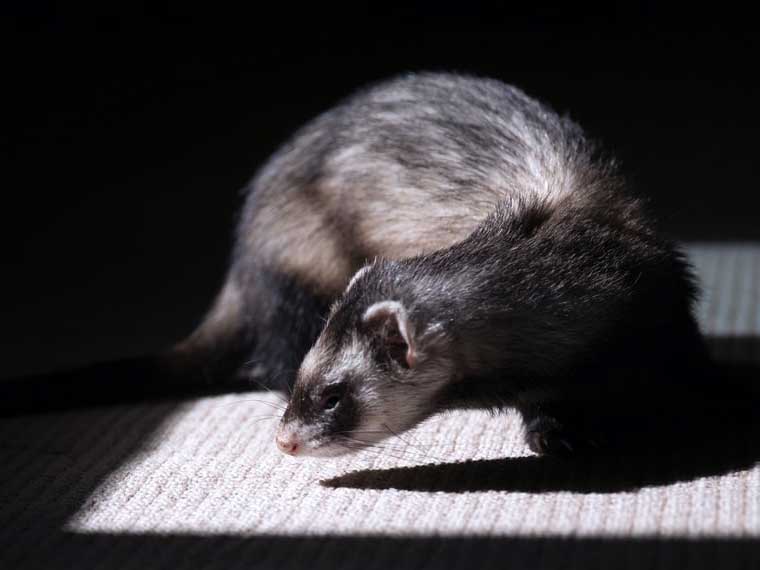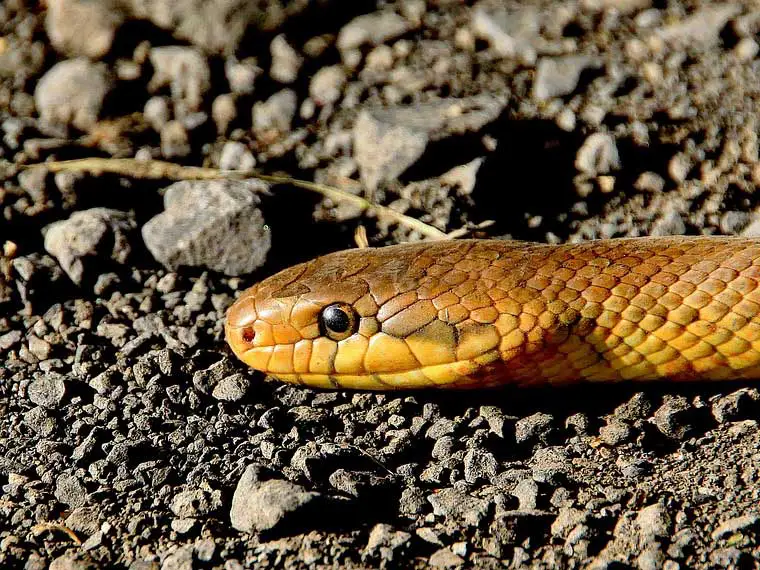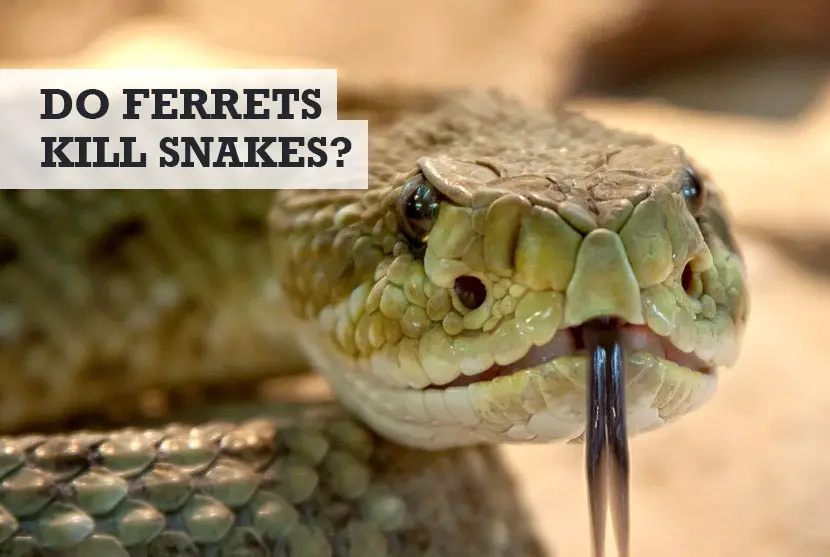Ferrets can make a great pet, particularly if you decide to keep a pair together. But did you know that there are also certain animals that ferrets will not get along with? One such creature is a snake. Here’s all you need to know about ferrets and snakes.
Do ferrets kill snakes?
Yes, ferrets can kill snakes. However, which creature is victorious in a fight depends on the size of the snake and how venomous it is. The ferret can and will inflict a great deal of bodily harm in the process.
The bottom line is that ferrets and snakes do not happily occupy the same space. They are arch enemies so one can kill the other.
If you have both ferrets and snakes as pets, you need to keep them in separate areas, far from each other.

Snakes and ferrets in the wild
Ferrets are members of the mustelidae family, the largest group within carnivora or flesh-eating mammals. They eat anything from sea creatures to birds and reptiles, depending on their species and habitat.
Do ferrets eat snakes?
Ferrets catch, kill, and eat snakes if they are hungry enough. As most ferrets are domesticated they will not view snakes as the most desirable item on the menu. They prefer catching easier prey such as rats and rabbits.
They do not fear snakes but view them as both predator and prey. Ferrets will ferociously guard their own territory, especially if they have young. They may or may not eat a snake that they have killed in self-defence.
Do ferrets keep snakes away
Usually, if a snake stumbles into ferret territory, it will consider discretion to be the greater part of valour, and try to get away. Snakes, like ferrets, prefer prey that do not out up a fight.
Therefore, it’s not a leap of faith to suggest that yes, ferrets can keep snakes away.
Ferrets can detect the scent of a snake and will hunt it down, if they feel hungry or threatened. Wisely, they attack the tail end. They are swift and agile fighters, with formidable teeth that can break bones and inflict tearing flesh wounds.
Most snakes will beat a hasty retreat after the first bite. A venomous snake will lash out and try to bite if cornered and a large constrictor may take its chances at crushing a ferret.
Even if the snake manages to kill the ferret, it will not emerge unscathed.
Snakes and ferrets in a domestic setting
Even in captivity, ferrets will instinctively consider a snake to be a threat. If it smells a snake near its territory it will pursue it and try to kill it – even if it’s in a cage.
If you keep both ferrets and snakes as pets, you will want to keep them far apart. If they are aware of each other this may cause stress to both animals. They will not live happily together. The ferret will hunt the snake down!
It is best not to even wear the same clothes when handling them. You will drive the ferret nuts and unsettle the snake.
You need to keep a tight lid on your snakes’ containers, in case there is any possibility of the ferret gaining access to the area in which they are kept. The ferret will find a way to get past a loose fitting lid or open tank to destroy a snake.
What happens if my snake and ferret fight?
Treatment of the ferret
Venomous snakes pose the most danger to your pet ferret. If it is bitten, you need to get it to a vet that understands ferrets and snake bites, immediately.
A snake bite, even from a venomous snake need not be toxic. The bite and the release of toxins are two different actions. The vet will need to assess whether your ferret has a ‘dry’ bite, i.e. without venom, or not.
Hopefully, the bite is just a flesh wound in which case, your ferret will need a tetanus injection and antibiotics to prevent infection. You will need to monitor the animal for about 12 hours to make certain no venom was released into its system.

If the bite did contain venom, you need to provide accurate information on the type and size of snake that attacked the ferret. There are inconclusive debates about whether smaller or larger snakes are more venomous but the information is useful nevertheless.
There are three main types of snake venom.
- Neurotoxins affect the nervous system and can cause generalised paralysis. Cobras are neurotoxic.
- Haemotoxins affect the blood, cause clotting and lower the victim’s blood pressure. Vipers and asps cause this kind of damage.
- Mytotoxins affect the muscles, causing tissue death. Adders fall into the category of snakes that cause muscle damage.
The antivenom used to combat the effects of the poison needs to be specific to the kind of snake bite. It creates antibodies that attack the proteins in the toxin. The wrong treatment can kill the patient.
Some antivenoms are administered intravenously and others straight into the tissue. Getting the dosage right is vital.
The animal also has to be monitored closely for a few hours in case it shows signs of allergic reaction to the serum, or goes into anaphylactic shock.
Neurotoxic and haemotoxic bites cause systemic problems and could prove fatal, whereas mytotoxic bites tend to cause localised damage and might lead to the amputation of a limb.
Some toxins have an accumulative effect which means that the likelihood of a severe allergic reaction becomes stronger with each bite. Hopefully, your ferret will survive its first bite from a venomous snake but it may not survive subsequent bites, despite immediate attention.
Handy Hint: If you are thinking about getting one I recommend you read why I believe ferrets can be good pets for beginners, but with some important caveats!
Treatment of the snake
Proceed with caution. Some snakes play dead when injured. Stay alert when handling an injured snake.
f your snake is venomous, you need to handle it carefully to ensure that you do not become a victim yourself. You may even consider venomoid surgery to neutralise its ability to inject venom into a bite.
Bites from most prey can cause infection, and even prove fatal to a snake, therefore you need to clean any wounds on the snake thoroughly.
If the wounds are near the face or are deep enough to expose bone or internal organs, you need to get your pet to a vet that knows how to treat snakes and is willing to do so. Many vets are reluctant to handle snakes because of the potential danger. If you cannot find a vet, try your local wildlife centre for assistance.
Major challenges in treating snakes include feeding, handling, stress and temperature control. Snakes are unable to regulate their body temperatures internally and rely on the relative heat of areas in their environment to do so. They move from one spot to another depending on their requirements.
An injured snake will seek out a spot that is a couple of degrees above its normal preferred temperature to recuperate. If it is incapacitated in such a spot, it may suffer heat stress. Its movements and condition need to monitored closely.
Snakes feel insecure in a new environment, especially if they are not well and feel defenceless. If your snake has to be kept in a veterinary clinic for observation for a period of time, it will benefit greatly from being housed in a space that it is familiar with. Take along the container that it is used to living in.
If you are treating the snake at home, keep handling to the absolute minimum in order to reduce stress. If you have more than one reptile, bear in mind that they carry infections on their skins which may be transferred from one animal to another. An injured snake will have a lowered resistance to disease.
Wash your hands after touching each pet. Snakes also carry zoonotic diseases that you would not like to acquire or pass on to other members or pets in your household.
Keep a close check on whether your snake is eating and how much. Feed it thawed, whole prey at room temperature for maximum nutrition, and make sure that the snake’s body temperature remains at its optimum during digestion.
Give the snake half an hour to eat the food provided. Remove anything that has not been consumed within that period, in order to prevent any undesirable fungal or bacterial development.
Be aware that there may be long term ill effects from a bite injury. For example, your snake may have difficulty shedding skin in an area that has been traumatised by scarring. This problem should diminish over time.
Do ferrets attract rats?
On a very similar tip, you might consider ferret and rat ownership. Whilst ferrets don’t attract wild rats to your property, they can kill them.
If your ferret lives outdoors in an enclosure, and your yard is secure, you could let them out (under supervision) to check for rats.
Conclusion
In summary, I don’t recommend you keep ferrets and snakes in the same house together. Ferrets can kill snakes. Ferrets can also eat snakes. It’s simply not a decent combination to have in your home as an animal lover.
You might also like…
- How to bond with your new pet ferret
- Keeping ferrets with dogs
- Deciphering the weird noises that ferrets make
Image of a snake and ferret in the header via https://pixabay.com/photos/speckled-rattlesnake-snake-animal-653642/


